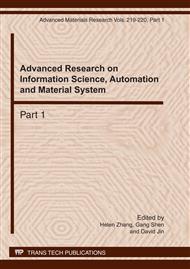[1]
C.N. Zhao, Y. Zhao, X.H. Tan, Y.S. Li and L.M. Luo: Course Evaluation Method Based on Analytic Hierarchy Process, IEEE CCCM(2010), pp.318-321.
Google Scholar
[2]
C.N. Zhao, Y.S. Li and L.M. Luo: Application of gray relational analysis for course evaluation. IEEE ICICTA(2010), pp.758-761.
Google Scholar
[3]
C.N. Zhao, L.M. Luo, Y. Zhao, Y.S. Li and X.H. Tan: A new course assessment method. International Conference on Education Technology and Computer(2010), p. V4485-V4488.
Google Scholar
[4]
M. Catherine: Assessing self-evaluation in a science methods course: Power, agency, authority and learning. Teaching and Teacher Education, vol.25 (2009), pp.758-766.
DOI: 10.1016/j.tate.2008.11.008
Google Scholar
[5]
F.K. Henry, K.P. Michael and P.R. Alfred: A comparison of student evaluations of teaching between online and face-to-face courses. The Internet and Higher Education, vol.10 (2007), pp.89-101.
DOI: 10.1016/j.iheduc.2007.02.001
Google Scholar
[6]
R.K. Jennifer, A.S. Judy: Course evaluation in medical education. Teaching and Teacher Education, vol.23 (2007), pp.251-264.
Google Scholar
[7]
T. Serap, E.Yavuz: The evaluation of modular education programmes developed for the modernization of vocational and technical education project,. Procedia-Social and Behavioral Sciences, vol.1(2009), pp.1384-1388.
DOI: 10.1016/j.sbspro.2009.01.244
Google Scholar
[8]
C.N. Zhao, X.D. Zhang: The application of fractional order PID controller to position servomechanism. IEEE WCICA (2008), pp.3380-3383.
Google Scholar
[9]
C.N. Zhao, Y. Zhao, Y. Liu, Y.S. Li and L.M. Luo: Fractional Personnel Losing Modeling Approach and Application,International Conference on Computational Intelligence and Software Engineering (2009), pp.1-4.
DOI: 10.1109/cise.2009.5365639
Google Scholar
[10]
C.N. Zhao, F. Pan and D.Y. Xue: H∞ controller design for fractional order system. Journal of Northeastern University, vol. 27(2006), pp.1189-1192.
Google Scholar
[11]
C.N. Zhao and D.Y. Xue: A solution to fractional order linear systems. Journal of Northeastern University, vol.28(2007), pp.10-13.
Google Scholar
[12]
C.N. Zhao, X.D. Zhang and Y.R. Sun: Simulation of commensurate fractional order systems. Journal of System Simulation(2008), pp.3948-3950.
Google Scholar


